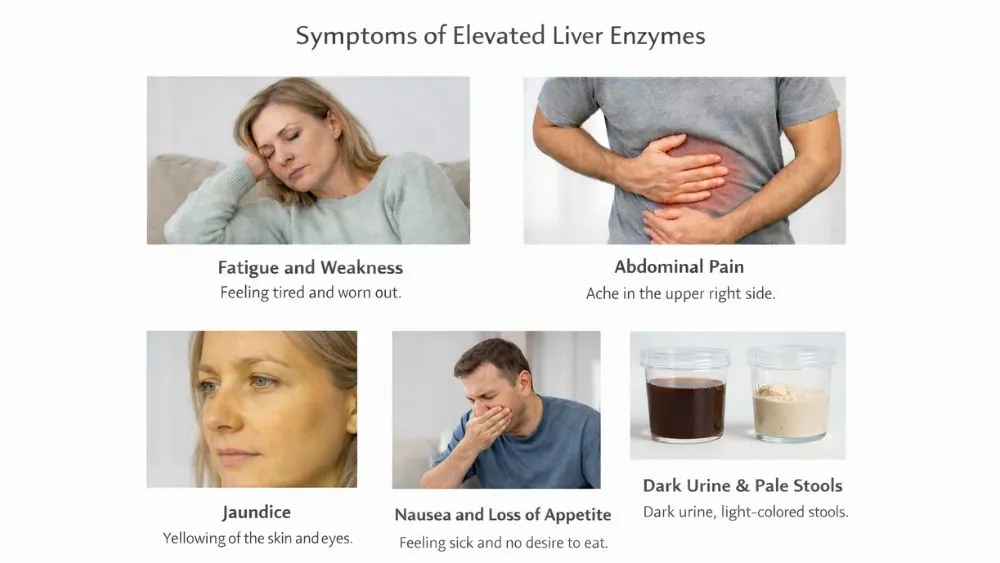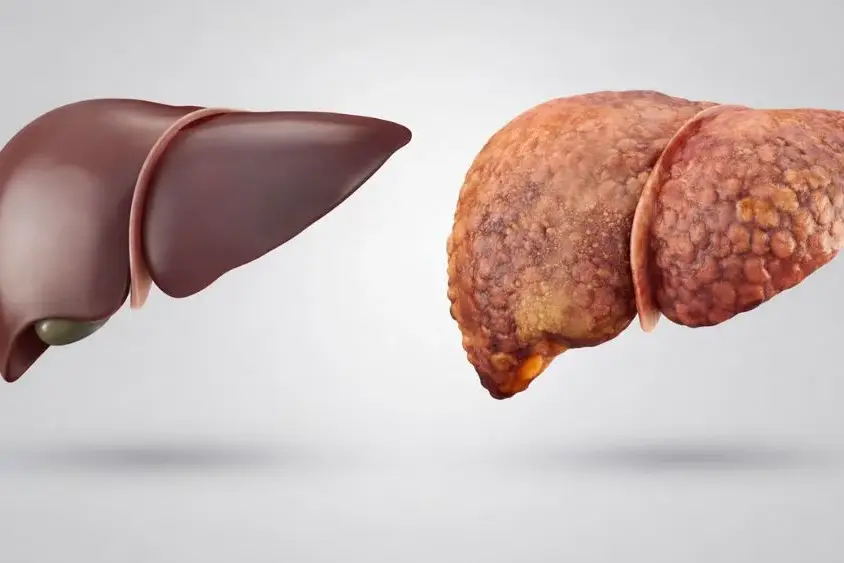Causes of elevated liver enzymes reflect stress, inflammation, or injury inside liver cells rather than a disease by itself. Enzyme levels rise when liver cells swell, leak, or break down under pressure from fat buildup, alcohol exposure, infections, medicines, immune attacks, or inherited disorders.
Table of Contents
ToggleThe most common triggers include fatty liver linked to weight gain and insulin resistance, regular alcohol intake, viral infections that inflame liver tissue, and medications or supplements processed by the liver. Less common but serious causes include autoimmune reactions, genetic metal buildup, and long-term scarring from untreated damage, which makes early testing and action critical.
Causes of Elevated Liver Enzymes
Liver enzymes rise when liver cells become inflamed, swollen, or damaged and leak enzymes into the bloodstream. The pattern and degree of elevation often point toward whether the injury is metabolic, toxic, infectious, immune-related, or genetic. Many causes overlap and can exist together, which is why repeated testing and history review matter.
Fatty Liver Disease
Fatty liver disease happens when fat builds up inside liver cells. This fat blocks normal liver work. You may not feel anything for years. Blood tests often show raised ALT first.
Fatty liver now ranks among the top causes of elevated liver enzymes worldwide. It links strongly to high sugar intake, refined carbs, and long sitting hours. Liver cells swell from fat pressure. This swelling releases enzymes into the blood. Early fatty liver often reverses with weight loss and diet change.
Alcohol Use or Alcohol-Related Liver Disease
Alcohol passes through the liver for breakdown. Frequent drinking forces liver cells to work overtime. This leads to inflammation and cell injury. Even without addiction, steady intake can raise enzymes.
Alcohol remains one of the most common causes of elevated liver enzymes because people underestimate their intake. Early injury may show higher AST than ALT. Continued exposure can lead to scarring and permanent damage.
Viral Infections (Hepatitis A, B, C, EBV)
Viruses can attack liver cells directly. Hepatitis viruses enter liver cells and trigger immune reactions. This causes swelling and enzyme leakage. Epstein-Barr virus can also affect the liver during infection.
In many cases, enzymes rise quickly and then fall after recovery. This pattern fits elevated liver enzymes and viral infection seen in younger people and travelers. Chronic hepatitis B or C can keep enzymes mildly high for years without symptoms.
Metabolic Syndrome
Metabolic syndrome means you have several issues together. These include high blood sugar, belly fat, abnormal cholesterol, and high blood pressure. These conditions disrupt liver fat handling. Fat and sugar overload stress liver cells daily. Over time, inflammation develops. Doctors often list this cluster among the leading causes of elevated liver enzymes in adults under fifty.
Obesity and Insulin Resistance
Insulin resistance means your body ignores insulin signals. The liver responds by storing more fat. Obesity increases this effect. Liver cells swell and inflamed. ALT rises first. AST may follow later. This mechanism explains many unexplained lab results. Obesity-related liver stress remains one of the fastest-growing causes of elevated liver enzymes in teens and adults.
Medication-Induced Liver Injury
Many medicines pass through the liver for processing. Some irritate liver cells. Pain relievers, seizure drugs, antibiotics, and cholesterol drugs can raise enzymes. This can happen even at safe doses in sensitive people.
Doctors always review medication lists when checking causes of elevated liver enzymes . Most drug-related elevations improve after stopping the trigger.
Herbal Supplements and Toxins
Some supplements contain liver-toxic compounds. Muscle-building products and weight-loss herbs cause hidden injury. Industrial chemicals and solvents also stress the liver. These exposures often go unnoticed. Doctors consider them when common causes of elevated liver enzymes do not fit.
Autoimmune Liver Diseases
Autoimmune liver disease occurs when your immune system attacks liver cells by mistake. This causes constant inflammation. Enzymes stay high without treatment. Fatigue often appears early. Blood markers help confirm this cause. It remains less common but serious among the causes of elevated liver enzymes .
Genetic Liver Disorders
Some liver diseases pass through families. Iron overload causes iron buildup inside liver cells. Copper buildup damages cells in another condition. These problems often show up in young people. Genetic testing helps confirm these causes of elevated liver enzymes .
Cirrhosis
Cirrhosis means long-term scarring of liver tissue. Early cirrhosis raises enzymes. Late cirrhosis may show normal enzymes despite severe damage. This makes blood tests alone unreliable. Cirrhosis often results from untreated causes of elevated liver enzymes over many years.
Symptoms of Elevated Liver Enzymes
Elevated enzymes alone do not cause symptoms, but the liver condition behind them does. Early signs are often vague because the liver compensates well until stress becomes significant. Symptoms usually reflect impaired bile flow, inflammation, or reduced energy processing rather than pain itself.
Fatigue and Weakness
You may feel tired despite rest. The liver helps manage energy. When stressed, energy balance suffers. This is one of the earliest symptoms of elevated liver enzymes reported by patients.
Abdominal Pain or Discomfort
You may feel pressure or dull pain on the upper right side of your belly. Liver swelling stretches its outer covering. This discomfort often signals ongoing inflammation.
Nausea and Loss of Appetite
Liver stress affects digestion. You may feel sick after meals. Appetite drops without a clear reason. These digestive changes appear in active symptoms of elevated liver enzymes .
Jaundice
Jaundice means yellow skin or eyes. It occurs when bilirubin builds up. This sign suggests significant liver stress and needs urgent review.
Dark Urine and Pale Stools
Changes in bile flow affect urine and stool color. Dark urine and light stools suggest blocked bile movement. These signs indicate advanced symptoms of elevated liver enzymes .
Diagnosing Elevated Liver Enzymes
Diagnosis relies on trends rather than a single abnormal result. Doctors assess enzyme ratios, duration of elevation, and associated lab markers to narrow causes. Imaging and targeted blood tests help separate reversible stress from progressive liver disease.
Blood Tests and Liver Function Panel
ALT and AST show liver cell injury. ALP and bilirubin reflect bile flow and processing. Doctors compare ratios, not just values. Repeat testing confirms trends. This forms the basis of the diagnosis of elevated liver enzymes .
Imaging Tests (Ultrasound, CT, MRI)
Imaging shows fat buildup, tumors, or bile blockage. Ultrasound often comes first because it is safe and quick. Imaging helps narrow the diagnosis of elevated liver enzymes when blood tests alone cannot.
Liver Biopsy
A biopsy removes a small tissue sample. Doctors use it when the cause remains unclear. It shows inflammation, fat, or scarring under a microscope. This step completes the diagnosis of elevated liver enzymes in complex cases.
Identifying Underlying Causes
Doctors review alcohol use, drugs, supplements, infections, and family history. Matching history with test patterns confirms the real trigger. Finding the root cause protects your liver long-term.
When Are Elevated Liver Enzymes Serious?
Severity depends on the speed of rise, persistence, and whether other liver functions decline. Rapid changes or enzyme elevation with symptoms suggest active damage. Chronic mild elevation can still be serious if left unchecked over time.
Rapidly Rising Enzyme Levels
A sudden jump in ALT or AST usually means acute liver injury. This can occur with toxins, drug reactions, blocked bile flow, elevated liver enzymes, and viral infections, such as acute hepatitis. Rapid rises signal ongoing cell damage. Doctors treat this as urgent because continued injury can lead to liver failure if not stopped early.
Enzyme Elevation With Symptoms
When abnormal labs appear along with pain, nausea, jaundice, or dark urine, the risk increases. Symptoms show the liver struggles to perform daily tasks. This combination often points to more aggressive causes of elevated liver enzymes that need immediate evaluation and monitoring.
Signs of Liver Failure
Confusion, easy bruising, swelling of the legs, or belly fluid signal liver failure. Enzyme levels alone do not define failure. These signs reflect loss of liver function. Untreated causes of elevated liver enzymes over time often lead to this stage.
Treatment for Elevated Liver Enzymes
Treatment for elevated liver enzymes focuses on stopping liver cell injury and allowing repair. Doctors do not treat lab numbers alone. They correct the underlying problem. Many livers heal well once the trigger is removed. Timing matters more than intensity of treatment.
Treating the Underlying Cause
Removing the cause allows enzymes to fall naturally. Weight loss improves fatty liver. Stopping alcohol reduces inflammation. Treating infections limits viral damage. This approach remains the most effective treatment for elevated liver enzymes across conditions.
Medication Adjustments
Doctors may pause or switch medicines that irritate the liver. This includes pain relievers and long-term drugs. Enzymes often normalize within weeks after removal. Medication review remains a key step in treatment for elevated liver enzymes , especially when symptoms are mild.
Antiviral or Autoimmune Therapies
Antiviral drugs suppress hepatitis viruses and reduce liver inflammation. Autoimmune liver disease may require immune-calming medicines. Doctors adjust doses based on response. These therapies directly target immune or viral causes of elevated liver enzymes .
Lifestyle-Based Treatment
Lifestyle change supports all medical therapies. Balanced meals, regular movement, and sleep reduce liver stress. These steps enhance every other treatment for elevated liver enzymes and reduce relapse risk.
Lifestyle Changes to Lower Liver Enzymes
Lifestyle directly affects liver fat storage, insulin signaling, and toxin exposure. Even modest changes can reduce liver inflammation. Consistency matters more than intensity when it comes to protecting liver cells.
Weight Loss and Diet Modification
Losing even a small amount of weight reduces liver fat. Cutting sugary drinks and refined carbs lowers fat storage. Adding fiber improves insulin use. These steps reverse many metabolic causes of elevated liver enzymes .
Reducing Alcohol Intake
Alcohol avoidance gives liver cells time to heal. Even moderate drinking slows recovery. Many people underestimate intake. Reducing alcohol remains one of the most powerful ways to lower enzyme levels linked to common causes of elevated liver enzymes .
Exercise and Physical Activity
Regular movement improves insulin sensitivity. This reduces fat delivery to the liver. Exercise lowers enzymes even without major weight loss. It also improves blood sugar and cholesterol control.
Managing Diabetes and Cholesterol
Good sugar control prevents excess fat buildup in liver cells. Managing cholesterol reduces fat transport to the liver. These steps target metabolic causes of elevated liver enzymes and prevent progression.
Can Elevated Liver Enzymes Be Prevented?
Not all liver problems can be avoided. Many can be delayed or reduced. Prevention focuses on early detection and risk reduction for common causes of elevated liver enzymes .
Regular Health Screenings
Routine blood tests catch silent liver stress early. Repeat testing confirms trends. Early action prevents long-term damage from common causes of elevated liver enzymes .
Safe Medication Use
Follow dosing instructions. Avoid mixing drugs without guidance. Inform doctors about supplements. These steps reduce drug-related causes of elevated liver enzymes .
Vaccination Against Hepatitis
Vaccines protect against hepatitis A and B. This prevents many cases of elevated liver enzymes viral infection that cause sudden enzyme spikes.
When to See a Doctor
Abnormal labs should never be ignored. Symptoms or family history increase the risk even if enzyme levels appear only mildly high. Early medical input often prevents progression to permanent damage.
Persistent Elevation on Repeat Tests
If enzymes stay high over time, further testing is needed. Persistent injury often reflects ongoing causes of elevated liver enzymes that need targeted treatment.
Symptoms Suggesting Liver Damage
Pain, jaundice, swelling, or confusion requires urgent review. These signs often appear when liver stress has progressed beyond mild injury.
Family History of Liver Disease
Inherited conditions raise risk even without symptoms. Family history guides early testing and prevention of genetic causes of elevated liver enzymes .
FAQs
Can stress cause elevated liver enzymes?
Stress alone does not damage liver cells. Indirect habits like a poor diet or alcohol may contribute. Stress itself is not a direct factor among recognized causes of elevated liver enzymes .
Are elevated liver enzymes always serious?
No. Mild increases often reverse with lifestyle change. Serious risk depends on cause, duration, and symptoms. Many causes of elevated liver enzymes resolve without permanent damage.
Can viral infections raise liver enzymes temporarily?
Yes. Many infections cause short-term rises. This includes flu-like illnesses and elevated liver enzymes viral infection cases that normalize after recovery without lasting harm.
How long does it take for liver enzymes to normalize?
Recovery time varies. Mild cases may improve within weeks. Chronic causes of elevated liver enzymes may need months of ongoing treatment and monitoring.
Can elevated liver enzymes indicate fatty liver disease?
Yes. Fatty liver ranks among the most common causes of elevated liver enzymes , especially in people with weight gain or insulin resistance.
Do elevated liver enzymes mean liver failure?
No. Enzymes reflect injury, not function. Liver failure involves clotting issues and mental changes. Many causes of elevated liver enzymes never lead to failure.
Can medications cause elevated liver enzymes?
Yes. Many drugs affect liver processing. Medication-related injury remains a frequent cause of elevated liver enzymes found during routine testing.
Are elevated liver enzymes reversible?
Often yes. Early action allows liver repair. Removing triggers resolves many causes of elevated liver enzymes before scarring occurs.
When should elevated liver enzymes be rechecked?
Doctors usually repeat tests within weeks or months. Timing depends on symptoms, risk factors, and suspected causes of elevated liver enzymes .
About The Author

Medically reviewed by Dr. Nivedita Pandey, MD, DM (Gastroenterology)
Senior Gastroenterologist & Hepatologist
Dr. Nivedita Pandey is a U.S.-trained gastroenterologist and hepatologist with extensive experience in diagnosing and treating liver diseases and gastrointestinal disorders. She specializes in liver enzyme abnormalities, fatty liver disease, hepatitis, cirrhosis, and digestive health.
All content is reviewed for medical accuracy and aligned with current clinical guidelines.
About Author | Instagram | Linkedin





